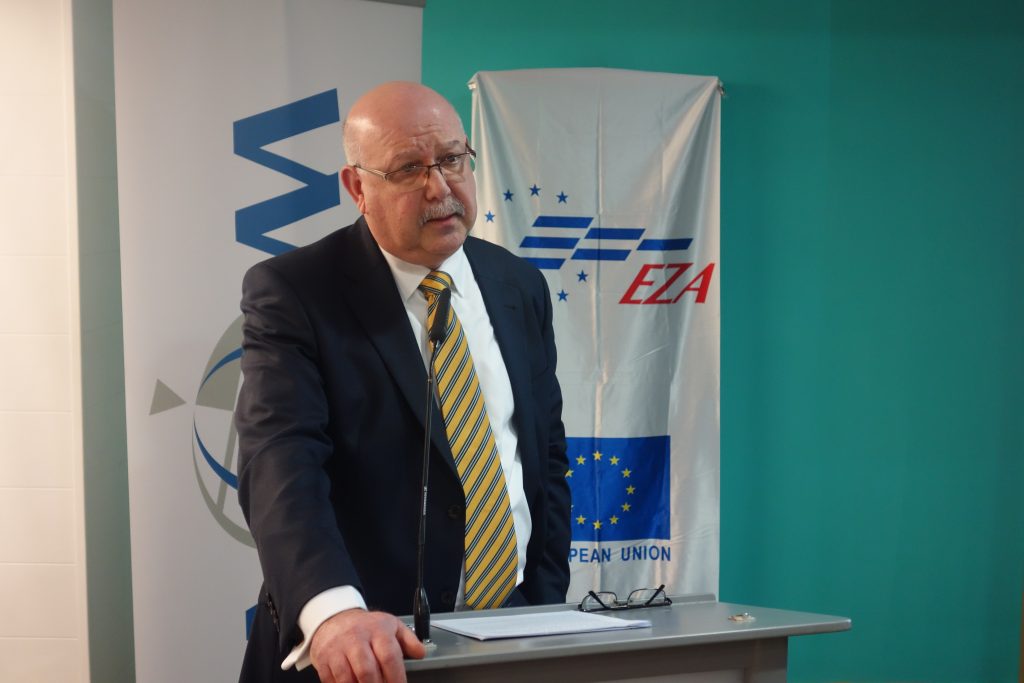Malta is in need of a long-term plan, Gejtu Vella, a human resources and industrial relations consultant who is also a former secretary general of the UHM, has said.
In an interview with The Malta Independent on Sunday, Vella highlighted the need for Malta to have a vision for the next five to 15 years. “If such a plan isn’t laid out, what new places of work and economic niches will we create? If we don’t start thinking about this, what sectors will we start encouraging our youths to aim for,” he asked.
“Many workplaces today may become obsolete in the future, but we need to start encouraging children to take up future jobs from today.”
Asked about the workforce, Vella said that the country did all it could to increase it, as a bigger workforce was needed. “We worked to enable more women to join the workforce, we also imported more than 100,000 workers, a number of whom come from the EU and a number from third countries.”
The size of the population has reached half a million, he said. While this looks good for the economy, “there are negative impacts on a number of sectors, such as traffic, infrastructure and the education system”, he said.
Looking at the tourism sector, Vella said that the country has yet to decide if it wants tourism of higher value, referring to the quantity vs quality argument. Malta attracts many tourists and many hotels were built, he adds, “but we have no strategic plan”.
He also said that there is no socio-economic and environmental long-term plan.
“I worry when I hear that people and entities like the Chamber of Commerce, hoteliers, SMEs and people in industry are not speaking with the same voice and are not on the same page,” he said, highlighting the government’s energy subsidies and the government’s economic vision for the coming 10 years, launched in 2021, as examples of such situations.
The country is at a crossroads, and it cannot remain at a crossroads, he said, adding that a decision regarding where the country will head needs to be taken.
Asked about foreign workers, he questioned what the country needs. “Should we opt for low-skilled workers or value added, high-skilled workers? In order to have the latter, we first need to have the industry and places of work that create quality jobs.” He said that “Malta is attracting very low-skilled third country national workers and unfortunately there are people who are abusing them”, he said in reference to precarious employment. He said that by abusing third country nationals and providing precarious work, such employers would also be preventing Maltese workers from acquiring reasonable good wages and working conditions. These abusive employers, he said, are keeping wages down.
Asked about foreign workers joining unions, he believes, while highlighting that he has not been involved in a union for many years, that some are reluctant. “While there are those who join unions, there are even some Maltese who are reluctant to join a union for a number of reasons. Imagine, then, how much foreign workers who are not in their own country, would be more reluctant to join a union. That is a problem. Unfortunately, there are those who would abuse of this, so much so that they wouldn’t pay them what is owed and their working conditions, as well as that of their Maltese counterparts, would also not improve. This is a serious problem,” he said.
Vella argued that the government’s plan to import a lot of labour was ill-conceived and just aimed at paying for pensions. “It was an ill-conceived plan. It wasn’t really a plan. Today it is clear that we attracted these workers to steal from them and abuse of them.”
He referred to the Justice and Peace Commission within the Archdiocese of Malta, which said that there are non-EU persons working in Malta who, despite paying National Insurance contributions, do not receive a pension.
“We are abusing of these workers. Is this the solidarity we talk about? We are a hypocritical country,” Vella said.
As for eliminating precarious work, he said that it can only be tackled “if we are able to raise the quality of work. If we do that, then we can start cutting out precarious work. If we don’t raise the quality of jobs, precarious work will remain”.
“Just look at the number of foreign workers who drive scooters on the roads recklessly, where in order for them to earn enough to get by they are risking their lives. Isn’t that also precarious work?”
“These are serious issues that we haven’t even started looking at.”
Asked about the COLA and the minimum wage, he noted that the government has established the Low Wage commission, which is tasked with recommending ways in which the minimum wage can be revised. “In my opinion that is not what we should be setting up, we should be establishing the living wage.”
“A living wage is the amount of income needed to provide an employee with a basic but socially acceptable standard of living. It is different from the minimum wage, which is an amount set by law to ensure workers have enough income to guarantee that they are living above the poverty level,” he said, quoting the European Foundation for the Improvement of Living and Working Conditions.
“We should have a decent living wage that allows one to live a decent life.”
He said that the COLA was introduced around 30 years ago. “It worked well. Before that it was like a national lottery over how much of an increase would be given at the beginning of each year, and there was a lot of industrial unrest.”
“Subsequently a national agreement was found, one that brought stability and industrial peace for 30 years.”
But should it be revised after 30 years and, if yes, how, he asked? He believes that for one thing, it should also start measuring the quality of life. Vella said that there are some who aren’t even being given the crumbs to eat.
He mentioned the Malta Council for Economic and Social Development (MCESD) which includes all social partners. “I am sure they are capable of putting forward suggestions and come up with a solution.”
“We should look forward,” he said, saying “the minimum wage is passé. It should now be about the living wage and the quality of life.”
The government is issuing refund cheques, he said. “Is that how we want our society to be? True social justice should be about getting what is yours by right. It shouldn’t be as though someone is doing you a favour, that is wrong.”
“Economic growth is good, but the distribution of wealth is going to the few and not the many.”
He was asked about a proposal made by the Malta Employers Association last year regarding the COLA mechanism. The MEA had said that the Cost of Living Adjustment mechanism should be modified to a minimum of €2.50 and a maximum of €6 per week for a period of five years. Then, any amounts accrued in favour of employees or employers will be awarded on the sixth year and beyond. Vella said that this would be very difficult to implement “because of the high rate of inflation, which even the governor of the Central Bank is calling a ‘monster'”.
“It’s biting people, biting low wage earners and pensioners particularly.” He said that pensioners are having a two-fold problem, due to the prices of every day goods, but also the prices of regular medication. “My mother is a pensioner and I can tell you that her pension is completely eaten up.”
This year the COLA was €9.90 and they are predicting thus far that next year it could be €13, he said. But he warns that there are two sides to this coin. “On the one hand, this increase is making good for the rise in expenditure due to inflation last year. But on the other, when there is such an increase prices of goods immediately rise again. One needs to be careful of a spiral.”
This is why, he said, “we need to move away from what has worked for the past 30 years and start looking at the quality of life”.
“Rather than measuring the traditional Gross Domestic Product (GDP), Malta should be calculating the social well-being which includes other indictors like health, education, environment, good governance, meaningful social dialogue and indeed augmenting wages and pensions to combat inflation which, as it stands currently, is eroding the purchasing power not only of the low-income groups, but of the middle class too.”
“The well-being of a person, irrespective of his or her status, should be measured not by his or her income only, but by other opportunities, such as career progression particularly if still in employment.”
This, he said, can be achieved if life-long learning is fully embraced by all stakeholders.
Malta needs to further assist local businesses and attract foreign direct investment niches with high value added, he said. “We should endeavour to preserve Malta’s identity and proper values Malta was renowned for in a globalised market. A safety net should act like a trampoline to put people back on their feet without hitting hard on the ground in the event they fall through the fissures of social benefits.”
Unfortunately, notwithstanding the current vibrant GDP economic growth, the number of people still living at the risk of poverty and social exclusion is rather high, to the extent that thousands rely on food banks and soup kitchens set up to provide lunch and dinner on a daily basis, he added. “Something is fundamentally and structurally wrong and needs to be rectified without further delay.”
“Solidarity must not be a measly slogan, but a significant leap forward in the quality of life of all, particularly of the vulnerable.”
Asked for his thoughts on the Air Malta situation, and what his advice for the current workers would be, he said that the airline has been “on the front burner” of the country for years, “but everyone has taken the workers for a ride. Unfortunately, there were times when workers were told that the airline was making money, and that was very unfair as it seems it wasn’t true”.
“On the occasion of 1 May, both political party leaders visited many workplaces. But nobody went to visit the Air Malta workers and speak to them. Why didn’t they? Air Malta employees also have families.”
He is worried about statements where, on the one hand the Air Malta chairman says the airline would not exist by the end of the year, and on the other hand the minister says that they are still in discussions with the European Commission. “Who is leading Air Malta? Are they not even on the same page? What signals are being sent to workers? It’s not fair on them. Couldn’t the chairman and the minister talk to each other before making a statement like that? We are talking about jobs and if Air Malta goes bust, the workers would need to reapply with a new airline that would be set up. If that is the case they would have different working conditions as it’s not a transfer of business.”
“It’s very unfortunate and the country needs a national airline.”





